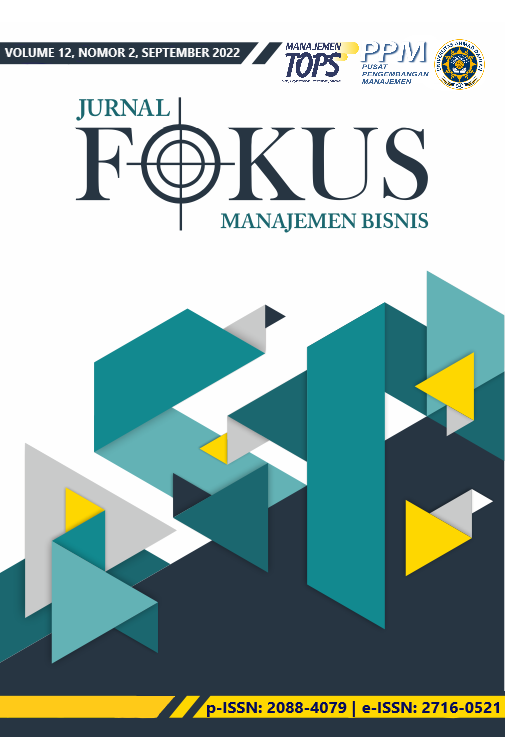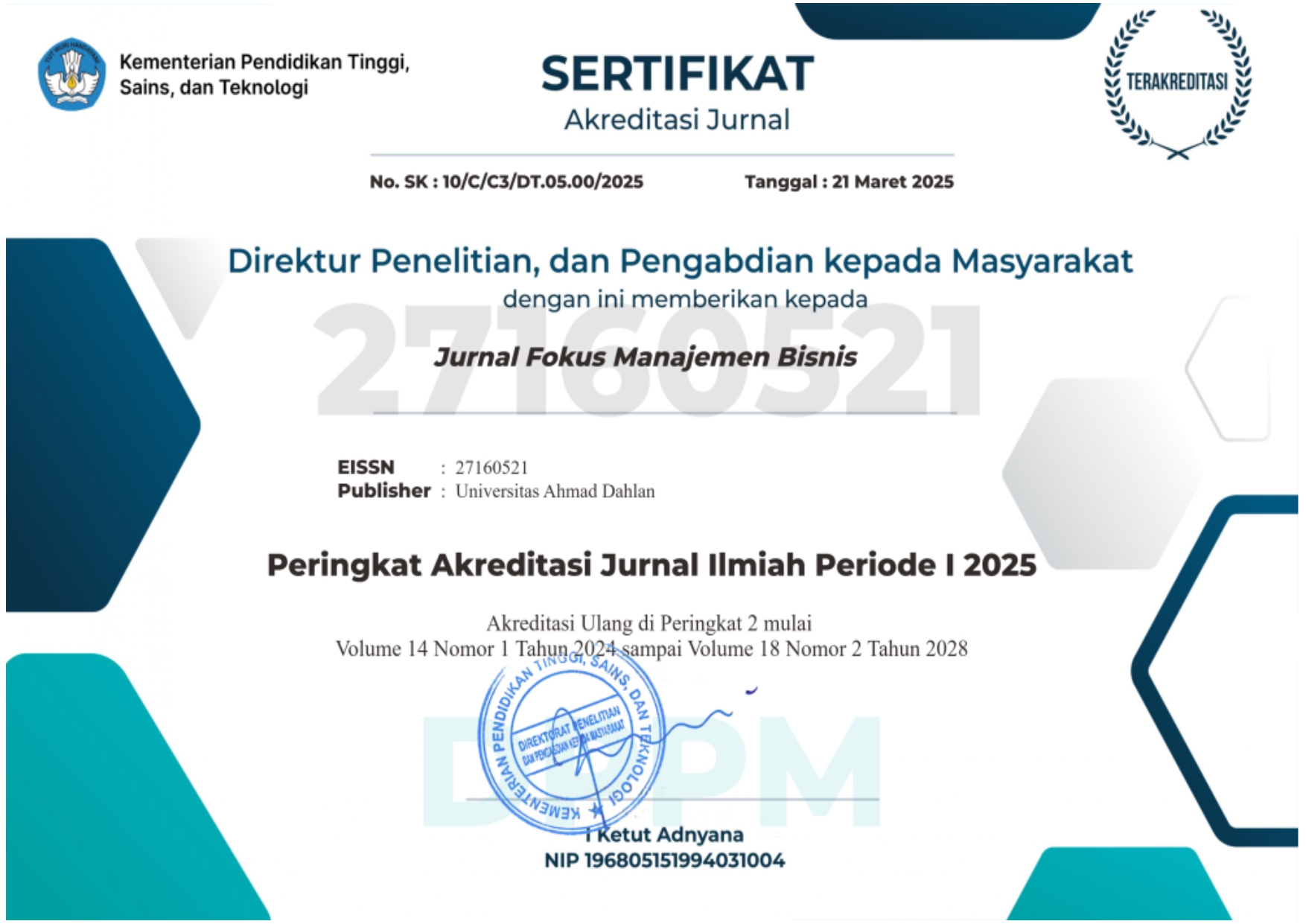PENGARUH SIKAP INDIVIDU, NORMA SUBJEKTIF, DAN PERSEPSI KONTROL PERILAKU TERHADAP NIAT BEPERGIAN
DOI:
https://doi.org/10.12928/fokus.v12i2.6810Abstract
This study aims to determine the effect of individual attitude, subjective norm, and perception of behavioral control on travel intentions during the Covid-19 pandemic. Respondents in this study were students in the Special Region of Yogyakarta who wanted to travel during the Covid-19 pandemic. Data collection techniques were carried out using questionnaires distributed through google forms and 205 respondents were obtained. The results of the study prove that individual attitude have a positive but no significant effect on travel intentions during the Covid-19 pandemic. Then, the subjective norm have a positive effect on travel intentions during the Covid-19 pandemic. Last, perception of behavioral control have a positive effect on travel intentions during the Covid-19 pandemicThis study aims to determine the effect of individual attitude, subjective norm, and perception of behavioral control on travel intentions during the Covid-19 pandemic. Respondents in this study were students in the Special Region of Yogyakarta who wanted to travel during the Covid-19 pandemic. Data collection techniques were carried out using questionnaires distributed through google forms and 205 respondents were obtained. The results of the study prove that individual attitude have a positive but no significant effect on travel intentions during the Covid-19 pandemic. Then, the subjective norm have a positive effect on travel intentions during the Covid-19 pandemic. Last, perception of behavioral control have a positive effect on travel intentions during the Covid-19 pandemic.
References
Aiken, L. H. (2002). Superior Outcomes For Magnet Hospitals: The Evidence Base. Magnet Hospitals Revisited: Attraction and Retention of Professional Nurses.
Ajzen, I. (1985). From Intentions to Actions: A Theory of Planned Behavior. In Action Control.
Ajzen, I., & Fishbein, M. (1975). A Bayesian Analysis Of Attribution Processes. Psychological Bulletin, 82(2).
Algifari. (2017). Analisis Regresi, Teori, Kasus dan Solusi. BPFE UGM Yogyakarta.
Atmojo, M. E., & Fridayani, H. D. (2021). An Assessment of Covid-19 Pandemic Impact on Indonesian Tourism Sector. Journal of Governance and Public Policy, 8(1).
Bandura, A., Freeman, W. H., & Lightsey, R. (1999). Self-Efficacy: The Exercise of Control. Journal of Cognitive Psychotherapy, 13(2).
Bauer, R. A. (1960). Consumer Behaviour as Risk Taking. Dynamic Marketing for a Changing World. Proceedings of the 43rd National Conference of the American Marketing Association, Chicago.
Beerli, A., & Martín, J. D. (2004). Factors Influencing Destination Image. Annals of Tourism Research, 31(3).
Borhan, M. N., Ibrahim, A. N. H., Miskeen, M. A. A., Rahmat, R. A. O. K., & Alhodairi, A. M. (2017). Predicting Car Drivers’ Intention To Use Low Cost Airlines For Intercity Travel In Libya. Journal of Air Transport Management, 65.
Furchan, A. (2004). Pengantar Penelitian Dalam Pendidikan. In Journal of Chemical Information and Modeling (Issue 9).
Ghozali, I. (2018). Aplikasi Analisis Multivariate dengan Program IBM SPSS 25 (ke-9th ed.). Semarang: Badan Penerbit Universitas Diponegoro. In (Edisi 9). Semarang: Badan Penerbit Universitas Diponegoro.
Hair, J. F., Black, W. C., Babin, B. J., & Anderson, R. E. (2010). Multivariate Data Analysis. In Vectors.
Hale, J. L., Householder, B. J., & Greene, K. L. (2002). The Theory of Reasoned Action. The Persuasion Handbook: Developments in Theory and Practice, 14.
Hamidizadeh, M. R., Cheh, M. G., Moghadam, A. H., & Salimipour, S. (2016). Proposing a Model of the Effect of Word of Mouth on Destination Image of Tourists and Travel Intention. International Journal of Asian Social Science, 6(2).
Hrubes, D., Ajzen, I., & Daigle, J. (2001). Predicting Hunting Intentions And Behavior: An Application Of The Theory Of Planned Behavior. Leisure Sciences, 23(3).
Hsu, C. H. C., & Huang, S. (2012). An Extension of the Theory of Planned Behavior Model for Tourists. In Journal of Hospitality and Tourism Research (Vol. 36, Issue 3).
Hsu, M. S. (2012). A Study Of Internship Attitude, Subjective Norm, Perceived Behavioral Control, And Career Planning Of Hospitality Vocational College Students. Journal of Hospitality, Leisure, Sport and Tourism Education, 11(1).
Jalilvand, M. R., Samiei, N., Dini, B., & Manzari, P. Y. (2012). Examining The Structural Relationships Of Electronic Word Of Mouth, Destination Image, Tourist Attitude Toward Destination And Travel Intention: An Integrated Approach. Journal of Destination Marketing and Management, 1(1–2). Jalilvand, Mohammad Reza, & Samiei, N. (2012). The Effect Of Electronic Word Of Mouth On Brand Image And Purchase Intention: An Empirical Study In The Automobile Industry In Iran. Marketing Intelligence and Planning, 30(4).
Kanagaretnam, K., Mestelman, S., Nainar, K., & Shehata, M. (2009). The Impact Of Social Value Orientation And Risk Attitudes On Trust And Reciprocity. Journal of Economic Psychology, 30(3).
Ko, Y. J., Kim, K., Claussen, C. L., & Kim, T. H. (2008). The Effects Of Sport Involvement, Sponsor Awareness And Corporate Image On Intention To Purchase Sponsors’ Products. International Journal of Sports Marketing and Sponsorship, 9(2).
Kraus, S. J. (1995). Attitudes and the Prediction of Behavior: A Meta-Analysis of the Empirical Literature. Personality and Social Psychology Bulletin, 21(1).
Lee, J. W. C., & Tanusia, A. (2016). Energy Conservation Behavioural Intention: Attitudes, Subjective Norm And Self-Efficacy. IOP Conference Series: Earth and Environmental Science, 40(1).
Lee, M. C. (2009). Factors Influencing The Adoption Of Internet Banking: An Integration Of TAM And TPB With Perceived Risk And Perceived Benefit. Electronic Commerce Research and Applications, 8(3).
Leone, L. A., Fleischhacker, S., Anderson-Steeves, B., Harper, K., Winkler, M., Racine, E., Baquero, B., & Gittelsohn, J. (2020). Healthy Food Retail During The COVID-19 Pandemic: Challenges And Future Directions. International Journal of Environmental Research and Public Health, 17(20).
Moutinho, L. (1987). Consumer Behaviour in Tourism. European Journal of Marketing, 21(10).
Perić, G., Dramićanin, S., & Conić, M. (2021). The Impact Of Serbian Tourists’ Risk Perception On Their Travel Intentions During The Covid-19 Pandemic. European Journal of Tourism Research, 27.
Ragheb, M. G., & Tate, R. L. (1993). A Behavioural Model Of Leisure Participation, Based On Leisure Attitude, Motivation And Satisfaction. Leisure Studies, 12(1).
Rivai, V., & Murni, S. (2009). Education Management: Analisis Teori Dan Praktik. In Latvijas Universitātes raksti,.
Rodgers, W. M., Conner, M., & Murray, T. C. (2008). Distinguishing Among Perceived Control, Perceived Difficulty, And Self-Efficacy As Determinants Of Intentions And Behaviours. British Journal of Social Psychology, 47(4).
Ru, X., Wang, S., Chen, Q., & Yan, S. (2018). Exploring The Interaction Effects Of Norms And Attitudes On Green Travel Intention: An Empirical Study In Eastern China. Journal of Cleaner Production, 197.
Schiffman, L. G., & Kanuk, L. L. (1994). Consumer Behavior. Prentice-Hall.
Shan, G., Yee, C. L., & Ji, G. (2020). Effects Of Attitude, Subjective Norm, Perceived Behavioral Control, Customer Value and Accessibility On Intention To Visit Haizhou Gulf In China. Journal of Marketing Advances and Practices, 2(1).
Sobkow, A., Zaleskiewicz, T., Petrova, D., Garcia-Retamero, R., & Traczyk, J. (2020). Worry, Risk Perception, and Controllability Predict Intentions Toward COVID-19 Preventive Behaviors. Frontiers in Psychology, 11.
Sparks, B. (2007). Planning A Wine Tourism Vacation? Factors That Help To Predict Tourist Behavioural Intentions. Tourism Management, 28(5).
Sugiyono. (2017). Metode Penelitian Bisnis (Pendekatan Kuantitatif, Kualitatif, Kombinasi dan R&D). CV Alfabeta.
Terry, D. J., & Hogg, M. A. (1996). Group Norms And The Attitude-Behavior Relationship: A Role For Group Identification. Personality and Social Psychology Bulletin, 22(8). Vincent, V. C., & Thompson, W. (2002). Assessing Community Support And Sustainability For Ecotourism Development. Journal of Travel Research, 41(2).
Wan, C., Shen, G. Q., & Choi, S. (2018). The Moderating Effect Of Subjective Norm In Predicting Intention To Use Urban Green Spaces: A Study Of Hong Kong. Sustainable Cities and Society, 37.
Downloads
Published
How to Cite
Issue
Section
License
Copyright (c) 2022 Ricky Husada Saputra, Olivia Barcelona Nasution

This work is licensed under a Creative Commons Attribution-ShareAlike 4.0 International License.
Authors who publish with this journal agree to the following terms:Â
- Authors retain copyright and grant the journal right of first publication with the work simultaneously licensed under a Creative Commons Attribution License that allows others to share the work with an acknowledgment of the work's authorship and initial publication in this journal.
- Authors are able to enter into separate, additional contractual arrangements for the non-exclusive distribution of the journal's published version of the work (e.g., post it to an institutional repository or publish it in a book), with an acknowledgment of its initial publication in this journal.
- Authors are permitted and encouraged to post their work online (e.g., in institutional repositories or on their website) prior to and during the submission process, as it can lead to productive exchanges, as well as earlier and greater citation of published work (See The Effect of Open Access).







